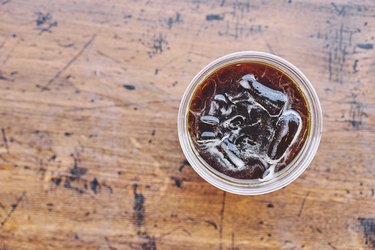
Over the years, cholesterol has been highly implicated in heart disease. Although many people associate meat and eggs with high cholesterol, there may be more of a connection between sugar-sweetened beverages, like soda, and diet soda and cholesterol.
Although the connection between heart disease and cholesterol has been largely misunderstood, there are some types of cholesterol, like small LDL particles, and other types of lipids, like triglycerides, that can contribute to its development. Because both regular soda and diet soda can increase cholesterol levels, it's best to drink them sparingly or not at all.
Video of the Day
Video of the Day
Tip
Both regular soda and diet soda can negatively affect your cholesterol and triglyceride levels. The fructose in regular soda and the artificial sweeteners in diet soda are largely to blame.
Regular Soda and Cholesterol Levels
Regular, sugar-sweetened sodas are one of the main sources of fructose in the American diet. In addition to contributing to nonalcoholic fatty liver disease, fructose can have a negative effect on your cholesterol levels. According to a report that was published in Diabetes Care in January 2013, drinking beverages sweetened with fructose can increase both LDL and total cholesterol levels.
A report that was published in the American Journal of Clinical Nutrition in April 2015 added that this change in cholesterol levels seems to affect men more than women. While LDL cholesterol and triglycerides went up in all participants in the study who drink fructose-sweetened beverages for a period of only two weeks, the effect was larger in men.
To add insult to injury, an October 2018 report in the journal Nutrients found that while increasing LDL cholesterol levels, sugar-sweetened beverages like soda could also decrease HDL, or "good," cholesterol levels. The report also connected consumption of sugar-sweetened beverages with abdominal obesity, increased fasting glucose and a higher risk of developing Type 2 diabetes.
Diet Soda and Cholesterol Levels
It seems like the simple solution to this would be to swap out the regular soda for diet soda, which doesn't have any calories, carbohydrates or fructose. But, unfortunately, the artificial sweeteners in diet soda that are used to replicate the sweet taste of fructose aren't much better.
As one study that was published in Critical Reviews in Food Science and Nutrition in April 2017 points out, aspartame, an artificial sweetener used to sweeten some of the most popular soda brands, can increase LDL cholesterol, even without a change in body weight or other parameters, like total cholesterol.
Another study that was published in the Journal of the American College of Nutrition in August 2018 also found that artificial sweeteners could increase triglycerides, another important lipid to consider when it comes to heart disease. That same study also connected artificial sweeteners to increased waist circumference and higher fasting glucose levels, two factors involved in metabolic syndrome.
Healthy Drinks to Replace Soda
It probably doesn't come as a surprise, but water tops the list when it comes to healthy drinks to replace soda. Water helps carry nutrients and oxygen to your cells, aids in proper digestion and helps regulate your body temperature. Harvard Health Publishing also adds that drinking enough water can help normalize your blood pressure and keep your heart beat stable.
But if you're looking for something other than plain water, there are some other healthy choices that won't negatively affect your cholesterol levels. Some options include:
- Flavored herbal teas over ice
- Sparkling water flavored with fresh or frozen fruit
- Hot water with a dash of cinnamon and a small amount of maple syrup
- Flat or sparkling water with fresh mint leaves
While indulging in a soda once in a while probably won't have a significant impact on your cholesterol levels, it's best to drink water or one of these other unsweetened options most of the time.
- Journal of the American College of Nutrition: "Associations Between Nonnutritive Sweetener Intake and Metabolic Syndrome in Adults"
- Harvard Health Publishing: "How Much Water Should You Drink?"
- Harvard Health Publishing: "New Concerns About Diet Soda"
- American Journal of Clinical Nutrition: "A Dose-Response Study of Consuming High-Fructose Corn Syrup–Sweetened Beverages on Lipid/Lipoprotein Risk Factors for Cardiovascular Disease in Young Adults"
- Harvard Health Publishing: "Abundance of Fructose Not Good for the Liver, Heart"
- Diabetes Care: "Potential Health Risks From Beverages Containing Fructose Found in Sugar or High-Fructose Corn Syrup"
- Nutrients: "Sugar-Sweetened Beverage Consumption in Relation to Obesity and Metabolic Syndrome Among Korean Adults: A Cross-Sectional Study From the 2012–2016 Korean National Health and Nutrition Examination Survey (KNHANES)"
- Critical Reviews in Food Science and Nutrition: "Metabolic Effects of Aspartame in Adulthood: A Systematic Review and Meta-Analysis of Randomized Clinical Trials"
Is this an emergency? If you are experiencing serious medical symptoms, please see the National Library of Medicine’s list of signs you need emergency medical attention or call 911.